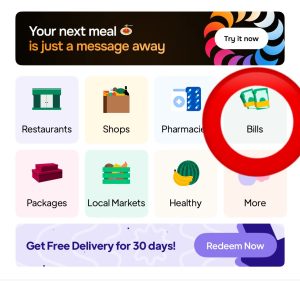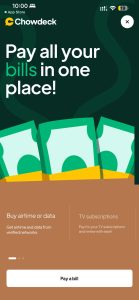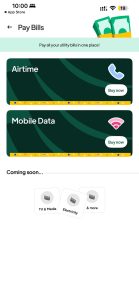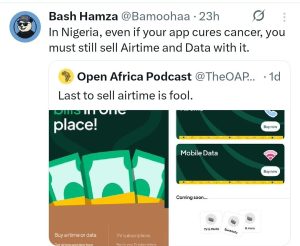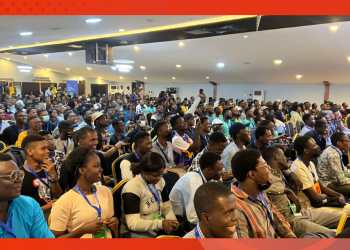It was a regular Tuesday at the office. I picked up my phone, eager to order Item 7’s famous shawarma. What I saw… I couldn’t believe it. Chowdeck is selling airtime keh? What’s even going on?
I scrolled again, thinking maybe I’d clicked the wrong tab, but no, it was right there, sitting right in the category section. A brand-new section called Bills. You can now buy airtime and data inside the same app where you get your lunch.
For a second, I just stared at it. This is the same Chowdeck that started with food deliveries in Lagos, the one that promised to get your meal to you before it gets cold. Now it wants to handle my phone recharge too?
Don’t get me wrong, I’m not against convenience. But there’s something funny about seeing your food app suddenly moonlight as a mini fintech. It makes you wonder: how did we get here? And more importantly, why does everyone suddenly want to sell airtime in this Nigeria?
Chowdeck Didn’t Start Out Like This
When Chowdeck launched, its only job was to deliver food fast. That was the pitch. You’d open the app, pick a restaurant, and a rider in a yellow helmet would appear at your gate before your hunger turned to regret. It was simple and efficient, that’s why most of us trusted it.
Over time, things started to evolve. First came grocery delivery, then restaurant subscriptions and promos, and then the Chowdeck wallet (which we honestly should have taken as a sign that they were testing how comfortable we were with spending more time – and money – inside the app). Even more recently, they have partnered with Bumpa, an e-commerce platform, to handle merchant deliveries with the same promise of same day delivery.
Now, the new Bills feature feels like the next stage in that evolution. It’s not just about food anymore. Chowdeck wants to be part of your daily routine, a “super app” if you will. Could it be that it was always a part of the business plan? Or was it just a dream realised after MTN announced it made ₦750.2 billion in profit this year. Either way, Chowdeck is buying our attention and we are listening!
So, Airtime? On Chowdeck?
The new Bills tab appeared sometime around late October. It sat there patiently, waiting for people like me to notice. Well…we have.
With the new “Buy Airtime” and “Buy Data” features, you can now top up your MTN, Airtel, or Glo line straight from the app. Same place you order Jollof.
To be fair, it’s not a bad idea. Chowdeck already has your card details, a working payment system, and a loyal user base. Adding airtime is an easy way to keep you coming back, even when you’re not hungry.
Still, something about it made me laugh. Maybe it’s because it’s such a Nigerian thing. Every app wants to sell airtime. Jumia, Konga, you name it. It’s like the ultimate sign that your app has “arrived”.
At this point, I wouldn’t be shocked if Boomplay decides to sell recharge cards between playlists.
But jokes aside, it says something deeper about where Nigerian tech is headed. Everyone is fighting for relevance beyond their core service, and airtime is the easiest door in.
The Super App Dream
If you’ve followed Chowdeck for a while, this move probably doesn’t surprise you. From the beginning, their CEO has talked about “building Africa’s most reliable delivery network.”
A super app is basically one platform that does everything. You order food, pay bills, book rides, buy airtime, maybe even chat with friends. We’ve seen it in Asia with Grab and Gojek. In Nigeria, Opay has come closest to pulling it off. Now Chowdeck seems to be taking small, deliberate steps in the same direction.
And it makes sense. Nigeria’s market loves convenience. If one app can help you eat, shop, pay, and ship, that’s one less download, one less password to remember, and more storage space on your iOS device. But it’s also a bold move. Food delivery is already tough with logistics, traffic, weather, and cost. Adding fintech layers means entering a completely new game, one that involves regulation, margins, and a different kind of competition.
Still, you can’t fault them for trying. In a country where mobile airtime is almost a daily expense, tapping into that flow of small, frequent payments is smart. Airtime might seem like a tiny feature, but it’s the kind of thing that keeps users opening your app, even on days when they’re not ordering anything.
What This Means for People Like Me
Honestly, I get it. It’s convenient. I already trust Chowdeck with my food orders, so topping up airtime there isn’t that wild. But there are some concerns and I’m not the only one thinking about it. Are the data plans cheaper? Can I access customer service if something is wrong with my topup? Why exactly do I need to use chowdeck to buy airtime?
Nigerians online had mixed reactions, some people explained it as a smart business move, others just found it hilarious.
One person said, “In Nigeria, even if your app cures cancer, you must still sell Airtime and Data with it.” And honestly, they’re not wrong. Every brand wants to be everything: the restaurant, the bank, the telecom, the payment gateway. It’s funny, but it also says a lot about how our tech ecosystem works: if you can hold users’ attention, you might as well monetise it.
My Final Take
At this point, I don’t blame Chowdeck. Nigeria’s digital economy rewards whoever can hold attention the longest. If airtime keeps users coming back, then it’s a smart move. But as a consumer, I still think we’re reaching “super app fatigue”. Every platform is now trying to do everything, and it’s starting to blur the lines between innovation and imitation.
Still, I’ll give them credit. They’ve built trust, executed well, and somehow kept a sense of humour through it all. If this airtime thing works, it might just be the start of Chowdeck quietly joining the super-app race.
For now though, I’ll just stick to my shawarma.



